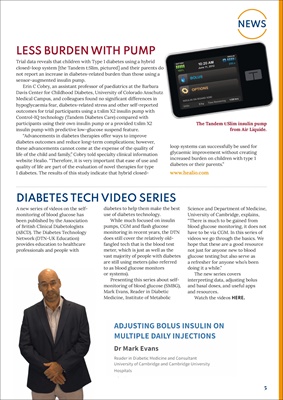
5
NEWS
LESS BURDEN WITH PUMP
DIABETES TECH VIDEO SERIES
Trial data reveals that children with Type 1 diabetes using a hybrid
closed-loop system [the Tandem t:Slim, pictured] and their parents do
not report an increase in diabetes-related burden than those using a
sensor-augmented insulin pump.
Erin C Cobry, an assistant professor of paediatrics at the Barbara
Davis Center for Childhood Diabetes, University of Colorado Anschutz
Medical Campus, and colleagues found no significant differences in
hypoglycaemia fear, diabetes-related stress and other self-reported
outcomes for trial participants using a t:slim X2 insulin pump with
Control-IQ technology (Tandem Diabetes Care) compared with
participants using their own insulin pump or a provided t:slim X2
insulin pump with predictive low-glucose suspend feature.
"Advancements in diabetes therapies offer ways to improve
diabetes outcomes and reduce long-term complications; however,
these advancements cannot come at the expense of the quality of
life of the child and family," Cobry told specialty clinical information
website Healio. "Therefore, it is very important that ease of use
and quality of life are part of the evaluation of novel therapies for
type 1 diabetes. The results of this study
indicate that hybrid closed-loop systems
can successfully be used for glycaemic
improvement without creating increased
burden on children with type 1 diabetes or
their parents."
www.healio.com
A new series of videos on the selfmonitoring
of blood glucose has
been published by the Association
of British Clinical Diabetologists
(ABCD). The Diabetes Technology
Network (DTN-UK Education)
provides education to healthcare
professionals and people with
diabetes to help them make the best
use of diabetes technology.
While much focused on insulin
pumps, CGM and flash glucose
monitoring in recent years, the DTN
does still cover the relatively oldfangled
tech that is the blood test
meter, which is just as well as the
vast majority of people with diabetes
are still using meters (also referred
to as blood glucose monitors
or systems).
Presenting this series about selfmonitoring
of blood glucose (SMBG),
Mark Evans, Reader in Diabetic
Medicine, Institute of Metabolic
Science and Department of
Medicine, University of Cambridge,
explains, "There is much to be gained
from blood glucose monitoring, it
does not have to be via CGM. In this
series of videos we go through the
basics. We hope that these are a good
resource not just for anyone new to
blood glucose testing but also serve
as a refresher for anyone who's been
doing it a while."
The new series covers
interpreting data, adjusting bolus
and basal doses, and useful apps
and resources.
Watch the videos HERE.